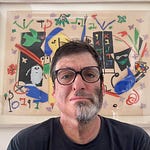In recent years, I’ve been researching some of the difficult questions surrounding the end of life. What truly matters in our final moments? What do we want to be remembered for? And how can we die better?
In one of my studies, I interviewed about one hundred end-of-life doulas. Just like birth doulas assist in bringing life into the world, end-of-life doulas — once referred to as “death doulas” — accompany people through their final moments. One of the central questions I asked them was: What is a good death?
The answer came up again and again, with striking consistency. A good death has four components:
1. A death without pain.
2. A death in which the person does not lose dignity in their body.
3. A death surrounded by love.
4. A death that leaves something behind — a legacy.
Later on Ron Sabar, one of my fellow palliative care specialists added something else that the end-of-life doulas did not include but I still think is important: To feel deep trust. Like that kids' game where you spread your arms and fall backward, knowing that somebody will catch you. That feeling.
5. The feeling of full trust in the people around you.
As always, I shared the findings of this research with anyone who wanted to listen — including my mother.
Two weeks ago, I was attending a conference in Amsterdam. I was supposed to return home on Friday, but due to the attack in Iran, all flights were canceled. On Shabbat, my mother said she had wanted to speak to me face to face, but since she didn’t know when I’d arrive, she asked that we start the conversation remotely.
This time, we didn’t speak about the end of life in general or abstract terms. We spoke about her end of life.
She told me that she had been thinking about the end for a long time. That life had become very difficult. That she was suffering. That the dignity of her body had been compromised. That she no longer enjoyed the things she once loved. And that she wanted to stop all treatments — and bring her life to an end.
As a researcher, I’m used to thinking about topics like these from the outside — as anecdotes or data points. But when it came to my mother, the starting point wasn’t professional. It was deeply personal. Emotional, not analytical.
And still, the research helped me. I understood how she felt. And even more — I saw that her thinking was clear, rational, filled with love and responsibility.
Over the next few days, she asked my sisters whether it was important for them that she wait for me. My sisters then asked me. I told them I would come as soon as I could — but that they should not wait for me, and they should not prolong my mother’s suffering even by a single minute just so I could say goodbye.
I managed to find a flight, and from there, a small boat that rocked for 20 hours on the way to Haifa — and I made it in time.
I got to tell her how much I love her. We spoke about childhood memories, about meaningful moments. She gave me instructions about what she wanted to happen next. Legacy. Family.
At some point, she fell asleep. Then she woke up again, and we talked some more. We hugged. That night, she took her sleeping medication. And in the morning, when we returned from the shelter, she was no longer breathing.
I’m incredibly sad. I’m crying as I write this. But I am certain she did exactly the right thing.
Just like in my research findings — she ensured she wouldn’t suffer, and took enough pain medication. She was surrounded by love. She spoke about and took care of her legacy. And when her control over her body was no longer enough, it was a sign that there was no reason to continue.
And when she felt it was time — she took responsibility for that final moment.
I miss her. Deeply.
But I’m also proud of her — for her courage, her clarity, and the way she claimed ownership over the final chapter of her life.
We live in a society that sees death as a failure of medicine, or as something we must not talk about. But perhaps it’s time to change our perspective. Maybe instead of clinging to life at any cost, we can learn from people like my mother — how to die with dignity, with love, and with choice.












